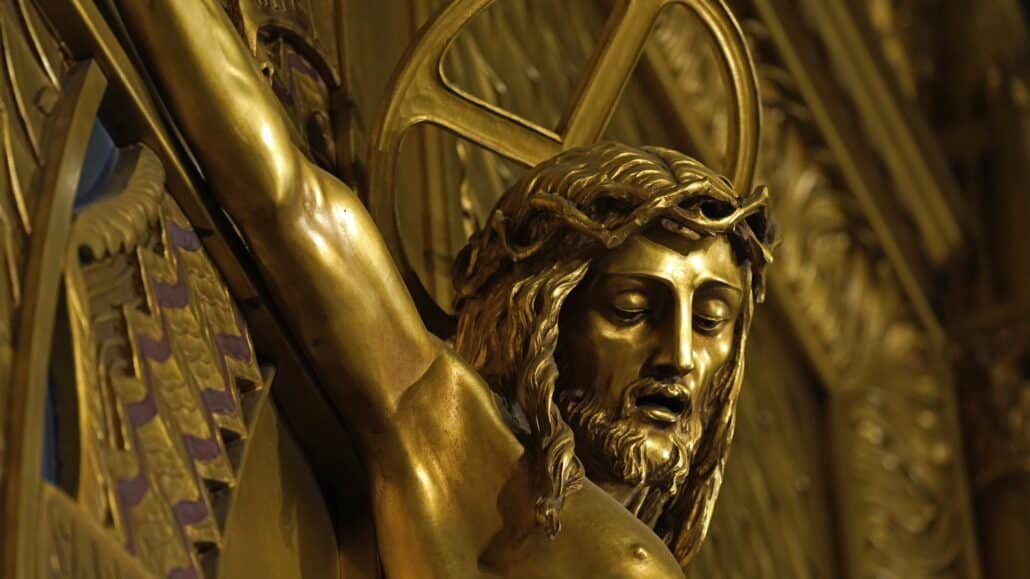I recently received a letter from a friend about her frustration with choosing a Lenten penance. “A couple of years ago,” Mary wrote, “I tried fasting but that just left a terrible taste in my mouth. On the two days a week that I would fast, I ended up thinking more about Kentucky Fried Chicken than anything spiritual. One year I tried going to evening Mass at the parish and even spending 20 minutes a day in silent prayer. But, truth be told, these activities didn’t do much to change my life, except make me aware of just how holy I can act when push comes to shove. And once Easter came along, I stopped going to evening Mass.
“Then last year,” her letter continued, “I decided to take a more positive approach after hearing Father Dan’s homily on the Sunday before Ash Wednesday. So I volunteered one night a week at the soup kitchen that he and the friars run in downtown Chicago. But talking to streetpeople isn’t my ‘thing,’ and I couldn’t find anything particularly edifying about washing dirty dishes. After all, I had more than my share waiting for me in the kitchen sink once I got home. So with Lent fast approaching, I find myself in my yearly quandary about adopting a Lenten penance. I just don’t know what to do or what it’s supposed to mean exactly. Got any ideas?”
Mary’s letter reminded me of my own annual struggles with choosing a Lenten penance that is helpful, useful and meaningful. So I picked up my Bible, went to a local park here in Hong Kong, and started reading and reflecting on the life and teachings of our brother Jesus for some answers.
Restoring Harmony
Our understanding of penance is based on our understanding of sin. Unfortunately, many of us tend to think of sin as only individual and specific acts which violate the spirit or actually break one of the Ten Commandments: “I missed Mass on Sunday.” “I deliberately lied.” “I gossiped and dishonored the reputation of a co-worker.”
When we have such a limited and narrow sense of sin, we are naturally going to have a limited and narrow sense of penance, of righting the individual wrongs we have committed. So we decide to attend a weekday Mass, to tell the truth the next time around, to praise the co-worker. But is it really possible to make up for that special moment of grace experienced in last Sunday’s communal celebration of the Eucharist? Does telling the truth the next time around actually fix yesterday’s lie? Does tomorrow’s praise of a maligned co-worker really heal the harm caused by our gossip?
When we think of Lenten penance as simply vacuuming up the dirty spots on the carpet of the soul, we bring a legalistic mentality to this 40-day period of grace. We simply reduce it to an extended calculation of credits and debits.
Lenten penance really has less to do about vacuum cleaners and the soul’s dirty carpets, and more to do with what the Chinese call the feng shui of a building. In Chinese culture, before someone builds a house or decorates a room, the feng shui expert is called in, using the words of an ancient Chinese text, “to ensure harmony in the middle.”
Still very much in demand today, the feng shui expert is a trained, natural ecologist of sorts who ensures that a building’s design or a room’s position does not violate the harmony and interrelationships found in a particular natural setting. By respecting the harmony of creation, a building and what goes on inside of it can be positively influenced by qi, the powerful energy arising from the harmonious relationship between feng (wind) and shui (water), between the feminine yin principle and masculine yang principle.
If something about the building or room destroys the harmony of the setting or causes the delicate interrelationships to go askew, it is the task of the feng shui expert to offer suggestions for redesign, replacement or redecoration. In effect, the feng shui expert is the protector and healer of nature’s relationships.
The analogy is perfect for a meaningful and helpful understanding of sin and Lenten penance. Sin is all about violating the natural harmony of the soul. It deliberately skews the God-given interrelationships between God, self and neighbor. It slams the door of my heart in God’s face. It is losing touch with my middle, my center, and spinning out of self-control. Sin builds walls to hide behind and constructs bridges that lead me away from my neighbor.
That is exactly the point of Jesus’ great parable of sin and repentance: the prodigal son (Luke 15:11-32). In this story the younger son demands his inheritance early, then walks away from his father and family. When he arrives in a distant country, he allows his life and his future, represented by his inheritance, to crumble before his eyes. Like a child’s top that has lost its momentum, everything loses its spin and comes to a grinding halt. All his primary relationships have been destroyed. And this poor boy wakes up one day and finds himself among the pigs, a stunning image for just how much his life and its interrelationships are in disarray.
The New Revised Standard Version‘s translation of this parable states that the prodigal son soon “came to himself” (15:17). It was as if he became the feng shui expert of his own soul and started reestablishing the primary relationship with himself. He spent time in self-reflection and brutal self-honesty. That period of time led him back to the road leading toward home, to the relationships that needed to be mended and ultimately to the reestablishment of natural harmony, symbolized in the wonderful coming-home party given by his father.
So penance is not simply fixing a broken commandment. It is reestablishing the interrelationships, bonds and connections that our pride, anger, gluttony, envy, greed, laziness, lust–our sin–throw into disarray. It is getting back on track where we belong. It is experiencing the energy–the grace–that comes with maintaining and developing healthy, balanced bonds with God, self and others. In short, the purpose of Lenten penance is to do the work of the feng shui expert: to reestablish and preserve the harmonious interrelationships intended by God at the dawn of creation.
Some Do’s and Don’ts
Penance is not some form of cosmetic surgery that simply changes the external actions of our lives. It must move each of us beyond pushing away from the lunch table, giving some spare change to a beggar or spending an extra 10 minutes in prayer. It must get underneath the skin and convert the heart–that is the center out of which everything flows.
Jesus said, “For from the heart come evil thoughts, murder, adultery, unchastity, theft, false witness, blasphemy” (Matthew 15:19). The heart is the place that the 40 days of Lent are meant to refashion. As we hear in the first reading of Ash Wednesday, “Yet even now, says the Lord, return to me with your whole heart, with fasting, and weeping, and mourning; Rend your hearts, not your garments…” (Joel 2:12-13).
If my Lenten penance doesn’t knock on the door of my heart, causing it to open and expand, then perhaps I will find myself among the scribes and Pharisees whom Jesus condemned for missing the boat even though they were doing the right things: “…You pay tithes of mint and dill and cummin, and have neglected the weightier things of the law: judgment and mercy and fidelity….You cleanse the outside of cup and dish, but inside they are full of plunder and self-indulgence….Even so, on the outside you appear righteous, but inside you are filled with hypocrisy and evildoing” (Matthew 23:23,25,28).
The parable of the prodigal son tells us that our Lenten penance should convert our hearts toward the relationships and obligations we have with others. Penance should be the booster rocket that brings us back into the gravitational pull and orbit of others.
We often tend to think that penance is a private and individual affair between each of us and God. But that challenging 25th chapter of Matthew’s Gospel makes it blatantly clear that our relationship with God is verified through our solidarity with others: “…whatever you did for one of these least brothers of mine, you did for me” (Matthew 25:40).
The First Letter of John says it in more striking terms: “If anyone says, ‘I love God,’ but hates his brother, he is a liar…” (4:20). That is why some people choose to adopt the traditional spiritual and corporal works of mercy as a form of penance: They all deal with entering into a relationship with another. Without question, my individual Lenten penance must have some kind of social manifestation or community consequences.
But Jesus makes it very clear that when doing a Lenten penance we should not hop onto a New Orleans Mardi Gras float and parade through the streets for public viewing: “[But] take care not to perform righteous deeds in order that people may see them; otherwise, you will have no recompense from your heavenly Father” (Matthew 6:1). Jesus continues by saying, “But when you give alms, do not let your left hand know what your right is doing” (Matthew 6:3). Our prayers should be succinct, to the point and said behind closed doors (Matthew 6:5-6), and our outward appearance or countenance should never betray the fact that we are fasting (Matthew 6:16-18).
Indeed, penance should never call explicit attention to itself or fill any of us with an arrogant sense of being holier than others. Jesus made this point in the parable of the Pharisee and the tax collector (Luke 18:9-14). The Pharisee was filled with pride for not being a public sinner, and for fasting twice a week and tithing his income. The tax collector, on the other hand, was deeply aware of his own sinfulness. Jesus noted that it was this tax collector who was justified in the eyes of God.
If my Lenten penance puts me on a pedestal above other people and not among them, causing me to reach down to them and not out to them, then I have made a tragic mistake. As my sister has often reminded me, “The higher you climb, the harder you fall.”
Prayer, Fasting, Almsgiving
The Judeo-Christian tradition has continually promoted prayer, fasting and almsgiving as the three basic and fundamental forms of penance. If you’re like me, you might initially balk at them, thinking them to be remnants of an outdated form of spirituality. But these three forms of penance are still excellent, perennial vehicles for reestablishing and fostering the harmony between the three natural relationships of God, self and others.
Prayer is the most intimate expression of our love for God. Because God has begun a relationship with each one of us in a unique way, each one of us has a different way to express the history of our relationship. For some, the rosary is the expression of love. For others, it is Scripture reading, charismatic prayer or numerous other forms of communal prayer. Some of us find our love summed up in centering prayer or solitary, prayerful walks in nature.
Whatever form it takes, prayer heightens our awareness of the presence of God in whom “…we live and move and have our being…” (Acts 17:28). It fine-tunes our spiritual antennae. Our individual time of prayer not only makes us immediately aware of this graced relationship that God shares with us but should also spill over into everything we do: the care we give to preparing meals, the mood we bring home from the office, the way we relate to others, our efforts to promote peace and justice in this world. Our great challenge with adopting prayer as a Lenten penance is to live our prayers, not simply say them.
The Judeo-Christian tradition has always held in high esteem the value and necessity of the prayer of intercession. We never go to God alone in prayer; we bring the world with its burdens and sufferings along with us. We intercede for the living and the dead because we know that the power of God’s love experienced in prayer does have an effect upon the hearts of others and, indeed, the world. One of the best ways to prepare for a moment of prayer or the celebration of the Eucharist is to watch the evening news or read a newspaper.
The relational effects of prayer in my life can also be found in my relationship with myself. Prayer often brings me face-to-face with my sometimes chaotic and divided heart. The growing awareness of God’s presence in my life often brings with it the awareness of just how far I have wandered away from my own center, my own heart. I become aware of just how restless I am or how little time I have taken for rest, relaxation and exercise. Prayer helps me rediscover and once again enter into a relationship not only with God and others but also with myself.
Another form of penance is fasting, an ancient expression of repentance found in the Hebrew Scriptures. The house of Israel, when pressed by Samuel to turn away from false gods and return to the Lord, expressed contrition through fasting (1 Samuel 7:6). When called to conversion by Jonah, the people of Nineveh called a fast (Jonah 3:5). The Prophet Isaiah explains true fasting, emphasizing you should be “[s]haring your bread with the hungry, sheltering the oppressed and the homeless; Clothing the naked when you see them, and not turning your back on your own” (58:7). Fasting, therefore, is a very physical way to express the fact that our relationships with God and others have gotten out of kilter.
Unlike John the Baptist and his followers, Jesus and his disciples do not fast–they eat and drink (Mark 2:18-22 and Matthew 11:18-19). For Christians, standing with sinners on equal ground, sharing bread with them and forming a bond of solidarity with them are more important than fasting. Perhaps that is why Saint Augustine, repeating the ancient teaching of the fathers of the Church, says that fasting is merely avarice and greed unless we give what we would have eaten to the poor and needy.
Fasting can also be a painful admission that I am not free, that my life is enslaved, obsessed or addicted to external things such as food, drink, codependent relationships, sex, television, privacy and the like. It can be a stern teacher, reminding me that I have severed the most basic of relationships–the one with myself–and allowed my life to spin out of self-control. It can speak loudly of loneliness and selfishness, of life with the pigs.
And so fasting, which many today think of as an individual and private form of penance, was always intended to have strong social implications. The Oxfam Fast and Catholic Relief Services’ Operation Rice Bowl bring us back into relationship with our larger, global family of brothers and sisters on the earth. Fasting from television and the Internet, and sharing that time with immediate family members and neglected friends, can help mend more immediate broken relationships. Fasting from that second beer at dinner can bring a more alert presence to family members. A most painful type of fasting involves entering a supervised program or group for chemical or drug addiction, but it can once again bring hope, healing and vitality to our personal lives. Fasting from our habits of wasting food, paper and water can help heal the very fragile relationship we have with the physical creation with which God has blessed us.
Almsgiving is another form of penance. According to the Hebrew Scriptures, almsgiving, which is derived from the Greek word for mercy, restores to the world the harmonious order intended by the Creator. We share with one another and with the wider family of creation a very real interdependence. The Lord tells the Israelites that every seventh year their fields, as well as their olive orchards and vineyards, are to rest and lie fallow “…that the poor among you may eat of it and the beasts of the field may eat what the poor leave…” (Exodus 23:11).
In Deuteronomy the Israelites are told that every third year they should take one tenth of their produce and store it within their towns. Then “the Levite who has no share in the heritage with you, and also the alien, the orphan and the widow who belong to your community, may come and eat their fill; so that the Lord, your God, may bless you in all that you undertake” (14:29). Thus their charity and mercy toward immigrants and the poor help to foster and strengthen their relationship with the Lord.
But almsgiving is more than the simple charity and philanthropy that is expressive of a merciful, compassionate heart. For the harmonious God-intended order–what Saint Paul calls “equality” (2 Corinthians 8:14)–to be reestablished, we must be aware of what the Great Almsgiver has given to each one of us in Christ.
It was because of the spiritual blessings Christ had given to the gentiles that Paul could then encourage them to share their material blessings with the poor of Jerusalem (Romans 15:25-27 and 1 Corinthians 16:1-3). We Christians give alms to the poor and needy as an acknowledgment and expression of gratitude for what we have been given by God in Christ.
Christian almsgiving challenges each one of us to stretch the size of our hearts so that the lives of others are enriched, following the example of Christ, whom Paul proposes as the model of almsgiving. “For you know the gracious act of our Lord Jesus Christ, that for your sake he became poor although he was rich, so that by his poverty you might become rich” (2 Corinthians 8:9). Furthermore, following the example of the poor widow whose generous gift impressed Jesus’ attention, we give out of our poverty and not merely out of our abundance (Mark 12:41-44).
Almsgiving causes us to take a hard look at our sometimes selfish hearts and return to the streets so we can root ourselves in the center of any situation where there are poor, needy or hurting people. We can express this traditional form of penance by giving the clothes we no longer wear to the St. Vincent de Paul Society. Or we can write out a generous check to a charitable organization. Other ways to give alms include donating our time to a soup kitchen in thanksgiving for the Bread of Life in our own life or writing a note of encouragement to a catechumen in the parish. We can share with others the water of the world and its effect in our own life by washing dishes by hand instead of using the dishwasher, and share other resources of the earth through voluntary recycling. We can babysit without pay for busy parents whose schedules or lifestyles do not afford them the luxury of a “night on the town.” And when we give unconditional forgiveness to those who have hurt us deeply, we offer the most precious of alms.
Coming Home
My friend Mary had asked me if I could give her any ideas for Lenten penance, but that’s something each of us must decide for ourselves. Our religious tradition clearly challenges us to see whether or not we are open to and in harmony with self, God and others.
My Lenten penance should bring me back to my personal center of gravity, to a humble, grateful and generous heart. My heart is the foundation of my life. Penance should deepen my awareness and experience of a loving, merciful God who runs out of his way to greet me with open arms at every moment of my life, like the father of the prodigal son. Such an awareness gives momentum to my life and provides a sure shelter for any season and any weather.
In imitation of that loving God, my Lenten penance should open up the door and windows of my soul so that I can roll out the red carpet for my brothers and sisters who are in need of forgiveness, companionship, encouragement and the basic essentials of life. Wherever there is a strong foundation, a sturdy shelter and a home open to others, there is harmony—Saint Paul’s “equality”—and good feng shui. To discover and maintain such a place is to be home where God intends me to be.








